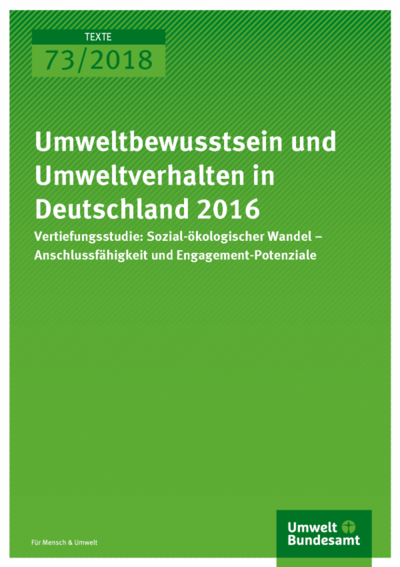Umweltbewusstsein und Umweltverhalten in Deutschland 2016 Vertiefungsstudie: Sozial-ökologischer Wandel – Anschlussfähigkeit und Engagement-Potenziale
The goal of this in-depth study is to examine the attractiveness and accessibility of the social-ecological change concept in the everyday lives of people, as well as to probe their preparedness to rise to the call of objectives and activities supporting sustainable development. Implementing a broad-range, open and empirical set of research tools comprising a qualitative pilot study (focus groups and moderated research online community) and the representative sample of the Environmental Awareness Study, perceived changes, viable solutions, transformational avenues and attitudes towards socio-ecological change were compiled. Initially, results revealed the social-ecological change concept as such had little or no impact on everyday thoughts and deeds. However, when dealing with concrete ideas and suggestions for generating sustainable production, consumption and daily habits, a strong affinity towards the idea of sustainability became evident.
In reference to people's readiness to become active to bring about social-ecological change, eight pat-terns of behaviour were identified. Empirically observed engagement patterns ranged from advocating specific values, personal consumer behaviours to group, organisation or campaign activism. Statistical coherencies show that engagement for social and ecological objectives is often pursued jointly. In addition, respondents place social and ecological challenges on an equal or similar priority level. Elsewhere, a potential for conflict and dilemmas between ecological and social challenges was also revealed, when, for example, it came to alternatives to the prevailing concept of economic growth or to the disparate environmental burdens of noise and air pollution.



